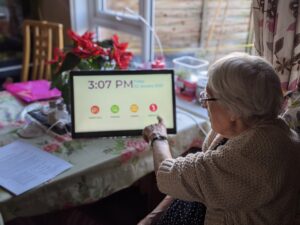By Penny Syddall, Dorset Council’s Programme Manager for Digital Skills and Adoption
The government is pushing councils and health authorities to work more closely and more efficiently to give residents the care they expect by establishing Integrated Care Systems (ICS). Dorset’s ICS was one of the first when it was created in 2018 and the drive towards a common approach to digital has dominated our partnership.
Dorset has one of the biggest health and social care challenges because of its demographics, with a much higher proportion of residents aged over 65 than regional and national averages. We have benefited from national funding to trial approaches to improving efficiency and have a few early, tentative conclusions.
Dorset Council has been working more closely with our local health partners in three main areas: by sharing data to understand population need, having common goals including a relentless focus on prevention and a shared approach to digital skills. We are beginning to see some of the benefits of this collaboration.

Sharing data
The award-winning Dorset Intelligence and Insight Service (DiiS) brings together millions of data records from health and social care across Dorset, which are pseudonymised and then made widely accessible via interactive digital dashboards. This amalgamation of data is delivering better outcomes for local people in a fairer, more cost-effective and productive way. It links health and social care information, providing population health management information and enabling clinicians to design services based on what is required across the ICS.
“It’s clinically led. Clinicians tell us what they want to achieve and we get them all the data and information they need,” says Stephen Slough, chief digital information officer at NHS Dorset. 800,000 patient records are updated nightly across Dorset, with other feeds updating every 15 minutes.
DiiS goes from strength to strength, providing high-level insights such as population health management which influences Public Health strategies (a council responsibility) and allowing clinicians to develop innovative pathways and services, enabling earlier intervention in care.
The public sector has traditionally had stronger links with the voluntary sector (VCSE); by working closer, NHS Dorset is now developing its own links with VCSE – and discovering it too has valuable data which can contribute to a holistic view of the patient.
Active Dorset is leading work locally and nationally to tackle fundamental whole system issues around data capture and the sharing that is needed to evidence and maximise the impact of prevention activities. By frequently capturing lifestyle data legally and linking it to patient records for inclusion on DiiS, it aims to show how community interventions are affecting population health and tackling inequalities. This might include changes to the wider determinants of health through engagement in lifestyle behaviour changes, social prescribing and non-clinical health interventions.
Strategies for prevention
Neil Bacon, Chief Strategy and Transformation Officer, NHS Dorset, said: “The focus now is on what we need to do to prevent illness, address inequalities and help communities manage their own health and wellbeing.
“Making prevention the core of what we do will lead to better outcomes and quality of life, more personalised services and, vitally, will reduce the inequities across the county. Prevention is a real and long-lasting way to reduce the unsustainable load on our health and care services.”
Increased digital applications is accepted as part of the solution and there are many great examples here in Dorset. We are trialling virtual wards and we have a library of apps available for public use which are ranked on various criteria and a suite of MyMHealth applications.
But there is a real fear that the rollout of digital health technology (DHT) across health and social care could increase inequalities. Are more vulnerable groups less able to take advantage of applications which provide people with more choice and better outcomes? In fact, early studies have shown that some traditionally vulnerable groups can take advantage with the right support. NHS Dorset has seen an uptake in health tools such as BP@Home in the homeless community. To ensure the right support is provided, we are working together to help people who struggle to do things digitally to adopt DHT.

Dorset Council has been piloting digital inclusion approaches with Dorset NHS for several years and has extended its support programme to encompass health. As well as recruiting and supporting volunteer digital champions (VDC) to work in surgeries, around 100 of its nearly 940 embedded digital champions are from the NHS. These frontline workers help people in the moment, as they need to download an app onto their phone for example, or signpost them to other services for more in-depth help. The council also has device and data-giving projects to help people get online which can be extended to those who need it to access health applications.
Dorset’s offer of technology-enabled care (TEC) aims to keep people in their own homes for longer, reducing hospital or care home admissions and helping them to return home sooner. We have two TEC Lounges which people can visit, giving them a chance to see the technology in action in a simulated home setting. They can judge whether some personalised TEC at home will be enough to prevent them coming into the social care system at all.
Most TEC is easy to use and requires little or no digital skills, although Dorset Council has been trialling different types of tablet which require different levels of skills, for remote consultations, reminders and so on.

Digital leadership, partnerships and skills
Clinicians need to get their heads round genomics, digital medicine, AI and robotics to provide a more holistic approach to personalised healthcare and disease prevention, according to the Topol Review of 2019. Indeed the whole workforce needs to upskill.
From social workers to GP receptionists, everyone needs the Essential Digital Skills for work. Today, 59% of the UK’s workforce can’t do all 20 digital tasks that industry and government have defined as essential for work, according to Futuredotnow (FutureDotNow-roadmap_final-digital.pdf). The healthcare workforce is performing worse than the UK national average, with 63% unable to perform these skills (in comparison to, say the tech industry at 33% or Government at 45%) (UK Essential Digital Skills for Work (lloydsbank.com)).
Regional organisations such as the Digital Skills Development Networks understand the need for upskilling at all levels. At South West Connect’s inaugural meeting in Taunton in June 2023, James Freed, head of the Digital Academy for Health and Care, said evidence shows around 70% of digital transformation projects fail. He suggested they fail because of culture, a lack of digital leadership, siloed decision-making and a lack of skills among other factors.
A good example is the digitisation of social care records, which is at risk of sticking at around 70% adoption in Dorset. This may be because of a lack of skill in social care organisations, so Dorset is planning to invest almost £100k in upskilling staff to see if that makes a difference. It will also address potential culture and leadership issues. If successful, the approach and/or training can be rolled out nationally.
Dorset Council has strong digital leadership; its chief executive Matt Prosser was the digital lead at SOLACE (the Society of local authority chief executives) and has taken that focus into his new role as SOLACE president. In Dorset he’s always ready to support digital projects such as the Embedded Digital Champion project which saw over 900 frontline staff in statutory, private and voluntary organisations across the ICS trained to help people who struggle to access our services at the point of need or to signpost on to other resources.
Dorset ICS is proud of its networked mindset. This small county has strong partnerships, which reduces siloed working. The ICS has set up D@SH (digital services at home) to co-ordinate digital initiatives. The group includes clinicians, project managers and subject experts from NHS Dorset, Dorset Council and Bournemouth Christchurch and Poole Council to bring a rounded view to the rollout of digital health and social care technology.
D@SH aims to lead the way in the adoption of digital health options, by empowering people through education, by improving digital readiness amongst our citizens and workforce and by encouraging self-management of their health and wellbeing.
The NHS and social care has never been under so much pressure. Digital and data driven intelligence must be key to making the system more efficient, easing pressures on overburdened health and care staff while saving public services money. More importantly, it can improve the services our residents receive by making care more readily available, in the comfort of their own home and help prevent illnesses or conditions from deteriorating.
But we must not lose sight of the fact digital is not easy for all – whether that be through a lack of skills, poor connectivity or the cost of living crisis. That’s why although the Dorset ICS is determined to embrace new digital technology, we do so with digital inclusion objectives underpinning all we do.

I have worked in communications for 25 years, first as a journalist and then in public and private sector public relations. From Southampton originally, I have lived in beautiful Dorset for the last two decades. My passion for Dorset has also turned into a passion for landscape photography. My other great loves are my family and Southampton Football Club.
